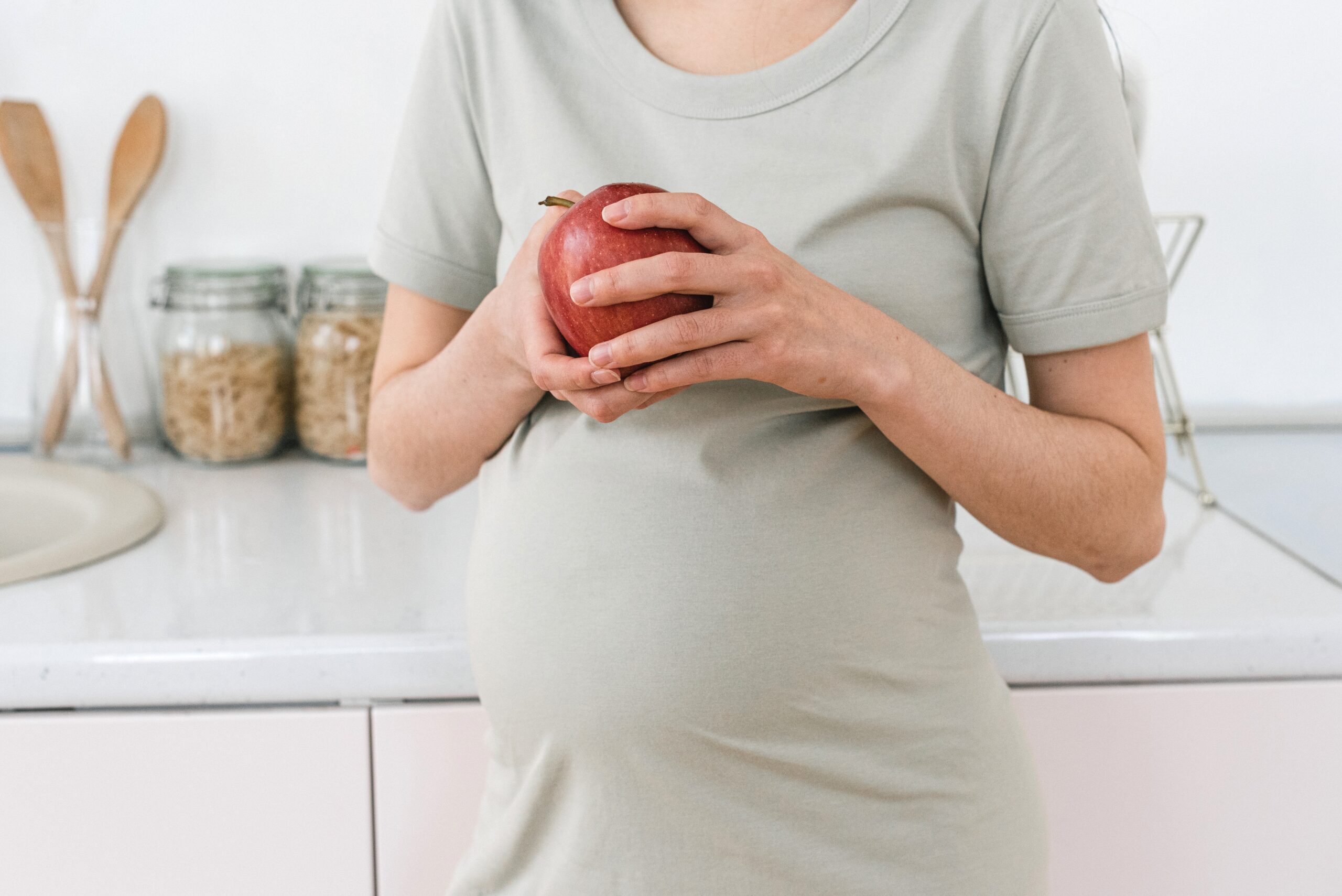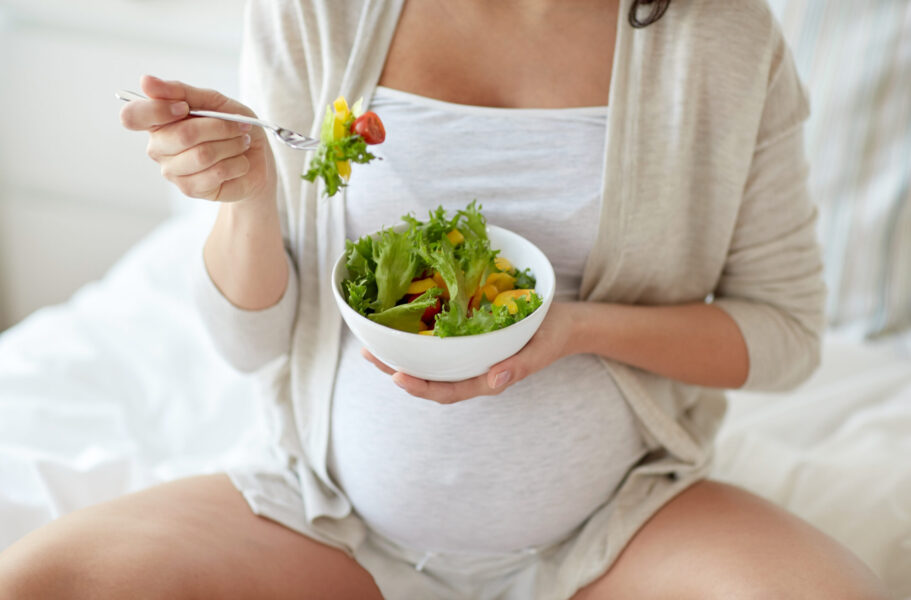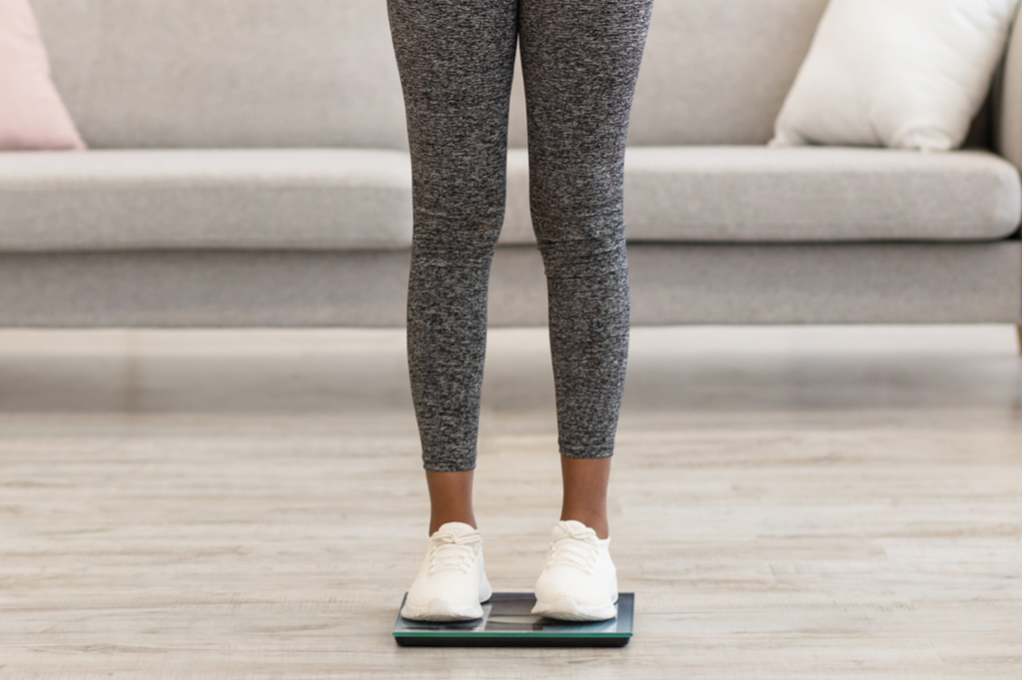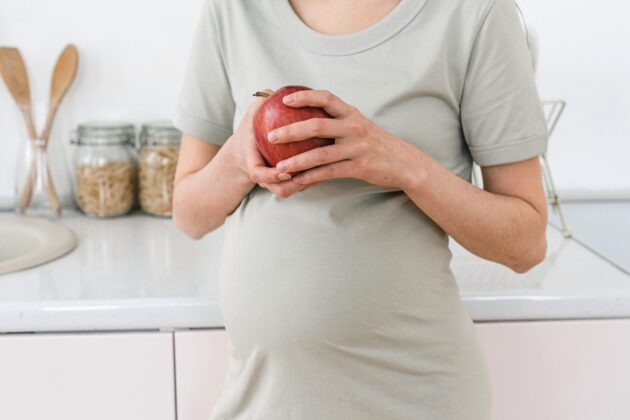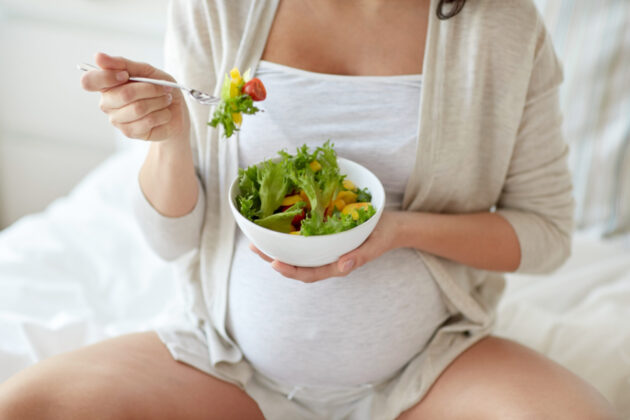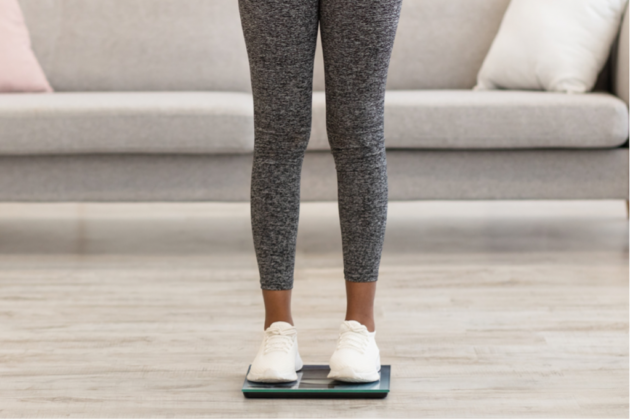Intermittent Fasting While Pregnant: How Long Can I Go Without Eating?
Sadia found out she was pregnant a month before the start of Ramadan. Even though pregnant women are exempt from fasting during Ramadan, she had always participated in the practices of her faith. Naturally, she felt torn. Would she harm her baby if she chose to fast this year?
Following religious customs is only one of the reasons a person might skip eating for periods of time. The practice, known as “intermittent fasting,” has also gained popularity as a health trend.
But is it okay to fast during pregnancy? How long is it safe to go without eating while pregnant?
The quick answer is this: during pregnancy, intermittent fasting is not recommended and could pose risks to you and your baby. Not eating for even 13 hours has been shown to cause serious issues.
This guide gives more information on how long you can go without eating while pregnant, if intermittent fasting is safe, the dangers of not eating while pregnant, and everything else you need to know about this dietary practice.
How long can I go without eating while pregnant?
In your life before pregnancy, you might have chosen to skip meals or fast for prolonged periods for reasons such as to lose weight, reduce blood sugar, or for religious or cultural reasons.
During pregnancy, however, fasting is not recommended. Developing babies need a steady source of nutrients, and when you fast, those nutrients aren’t available to nourish your baby.
Are there any times when fasting during pregnancy is more or less safe? Let’s take a look:
- First trimester. Your recommended caloric intake is generally the same as before pregnancy, so unless your doctor follows you carefully during the practice, fasting isn’t recommended. Learn more about the best first trimester foods here.
- Second trimester. The baby’s organs are growing steadily and beginning to function, so you need a lot of healthy nutrients during this time. From here on our, it’s not safe to lose weight during pregnancy.
- Third trimester. Your recommended caloric intake is about 2400 calories per day. Fasting can reduce the number of calories you get each day, which has been shown to reduce the baby’s birth weight, especially if you are carrying a boy.
>> Learn more: How many calories should I eat while pregnant?
Specific recommendations on how long you can go without eating vary during pregnancy. However, going to extremes and not eating for 48 hours during pregnancy would be entirely unsafe. Studies have shown that not eating for even 13 hours can increase the likelihood of preterm birth.
Eating is more than fun and tasty. When you eat healthy foods during pregnancy and steadily deliver nutrients to your baby, it grows and develops optimally, leading to better health outcomes.
We asked one of our providers here at Zaya Care—Natasha Eziquiel-Shriro, RDN—how long it’s safe to go without eating during pregnancy. Here’s what she had to say:
“Rather than try to stretch it, aim to eat a small meal or snack every 3 to 4 hours. Eating throughout the day will help keep energy up, improve mood, and make it easier to meet nutrient needs. By the time the morning rolls around it’s likely been 8 to 12 hours since the last meal, so it’s also important to get into a breakfast habit during pregnancy.
When it comes to safety, we also know that eating regularly lowers the risk of premature labor. Research shows that not eating for 13 or more hours per day through pregnancy raises stress hormones and can cause preterm delivery.”

Healthy mom, healthy baby: Get support from a prenatal dietitian
90% of Zaya Care patients pay $0 for one-on-one counseling with a Registered Dietitan
Is intermittent fasting safe while pregnant?
Intermittent fasting is an eating pattern in which you eat normally for specified periods of time and then fast for a number of hours or days in between. Various patterns of intermittent fasting have been studied:
- 5:2 fasting. You eat normally for five days but then eat only 400 to 500 calories on two other days. The two fasting days cannot be in a row.
- Alternate day fasting. You eat normally on one day but on the following day, you eat only 25% of the calories you would normally eat. Then, you eat normally again as the pattern is repeated.
- 24-hour fasting. This involves a random stoppage of food for 24 hours. This is done only one to two days per week. The exact number of days and the dates you choose are more arbitrary than the 5:2 fasting schedule.
- Time-restricted fasting. Daily fasting is part of this schedule. You can do it in several ways, including eating 12 hours and fasting 12 hours in a schedule called the 12:12 pattern. Another option is the 16:8 pattern, where you eat only eight hours per day, then fast for 16.
This type of fasting is not dangerous in a non-pregnant individual. In fact, there are health benefits to intermittent fasting, including reduced levels of inflammation, oxidative stress, and cardiovascular complications.
During pregnancy, however, dieting is not recommended in any form. Studies on women who practiced intermittent fasting during Ramadan indicated that fasting in the second trimester increased the chances of having a severely preterm baby.
Being born preterm is risky for your baby. Common complications of being born before 37 weeks of gestation include:
- Cerebral palsy
- Developmental delay or compromise
- Visual and hearing-related problems
- Lung damage
Even if you feel like you are gaining a lot of weight and not eating much during pregnancy, intermittent fasting is generally not a good idea during pregnancy.
Instead, consider working with a prenatal nutritionist and focusing on eating healthy, well-balanced meals and healthy snacks.
Here at Zaya Care, we can help you find a prenatal nutritionist that accepts your insurance and preferred visit type (in-person, online, etc.).
We asked Natasha Eziquiel-Shriro, RDN if intermittent fasting is safe during pregnancy. Here’s what she had to say:
“Intermittent fasting during pregnancy is not a great idea. Between bedtime and breakfast, the body naturally experiences a fasting period. Although a woman might be used to going longer than overnight without eating, there are a few good reasons to ditch a fast while pregnant.
For one, being famished can come with nausea and lightheadedness. Why ruin an otherwise nice morning? Two, some folks will try to meet calorie and nutrient needs by fitting larger meals into a shorter eating window. This could worsen the acid reflux or heartburn common later in pregnancy as the stomach gets squeezed by a growing baby. Lastly and most importantly, studies show that prolonged fasting leads to higher concentrations of corticotropin-releasing hormone, a natural brain chemical triggered by stressful experiences, and increases the risk of premature birth.”
>> Find a prenatal nutritionist that can help you stay healthy during pregnancy
Dangers of not eating enough & fasting while pregnant
Eating healthily during pregnancy is a balancing act worth mastering. Not only must you eat the recommended number of calories to support your baby, but the evidence also suggests that you need to eat steadily throughout the day. Your energy stores alone are not sufficient to feed your baby for very long.
Let’s look at the risks of not eating enough during pregnancy:
- Preterm birth. Fasting intermittently in the second trimester has been linked to having very preterm babies. The more premature your baby is at the time of birth, the greater the risk of complications.
- Poor fetal growth. Your baby may not grow adequately if your calories are restricted with intermittent fasting. One study indicated that boy babies are more likely to have growth restrictions than girls.
- Nutrient deficiencies. If you restrict your food intake, your intake of valuable nutrients is also lowered. Your baby needs a steady supply of vitamins and minerals to continue to grow properly.
- Reduction in frequency of fetal movements. You may notice that your baby moves more after a meal. If you don’t get enough food energy, your baby will be less likely to move around inside your uterus.
- Anemia. If you restrict your intake of iron-rich and vitamin B-laden foods, you will be more likely to become anemic. Evidence suggests that this could affect your baby after birth, with greater risks of anemia in the first year of life.
Temporarily going without food can affect you as well. You may get headaches or become lightheaded or dizzy if your fasting has led to low fluid intake or low blood sugar. Eating alternated with fasting can confuse your GI tract, leading to an increased risk of heartburn or other digestive issues. Fasting can also make it harder to sleep properly during your pregnancy.
>> Read More: Dealing with loss of appetite during pregnancy
Is intermittent fasting safe while breastfeeding?
Optimal eating while breastfeeding is just as important as eating during pregnancy. Your baby relies on your day-to-day fluid and nutrient intake. Your existing body fat stores will not provide enough nutrients for your baby if you don’t eat and drink for an extended period.
Evidence suggests that you can go without eating for more than 12 hours while breastfeeding and not affect your baby’s nutrition. But problems arise if you engage in intermittent fasting for longer than a few days. It should not be a regular practice to go without food while breastfeeding your baby.
Fasting increases the risk of dehydration as well. When you don’t get enough to drink, you will find it harder to satisfy your baby’s need for fluid. This can mean an unhappy baby demanding to feed more often just to gain fluids.
Is intermittent fasting safe while trying to get pregnant?
You should always check with your doctor before making a significant change to your diet but, in general, intermittent fasting is safe for most people before pregnancy. Not only that, but it could also help some people conceive.
If you have polycystic ovary syndrome (PCOS) or other causes of high androgen (male hormone) levels, intermittent fasting could help. It has been shown to reduce male hormone levels and improve your hormonal status. This alone can help you get pregnant.
Intermittent fasting also reduces your chances of developing gestational diabetes and may help you lose weight in preparation for pregnancy. Obesity negatively impacts fertility, so dropping a few pounds may improve your chances of becoming pregnant. Check here for reasons you’re not losing weight while intermittent fasting.

Healthy mom, healthy baby: Get support from a prenatal dietitian
90% of Zaya Care patients pay $0 for one-on-one counseling with a Registered Dietitan
Sadia found out she was pregnant a month before the start of Ramadan. Even though pregnant women are exempt from fasting during Ramadan, she had always participated in the practices of her faith. Naturally, she felt torn. Would she harm her baby if she chose to fast this year?
Following religious customs is only one of the reasons a person might skip eating for periods of time. The practice, known as “intermittent fasting,” has also gained popularity as a health trend.
But is it okay to fast during pregnancy? How long is it safe to go without eating while pregnant?
The quick answer is this: during pregnancy, intermittent fasting is not recommended and could pose risks to you and your baby. Not eating for even 13 hours has been shown to cause serious issues.
This guide gives more information on how long you can go without eating while pregnant, if intermittent fasting is safe, the dangers of not eating while pregnant, and everything else you need to know about this dietary practice.
How long can I go without eating while pregnant?
In your life before pregnancy, you might have chosen to skip meals or fast for prolonged periods for reasons such as to lose weight, reduce blood sugar, or for religious or cultural reasons.
During pregnancy, however, fasting is not recommended. Developing babies need a steady source of nutrients, and when you fast, those nutrients aren’t available to nourish your baby.
Are there any times when fasting during pregnancy is more or less safe? Let’s take a look:
- First trimester. Your recommended caloric intake is generally the same as before pregnancy, so unless your doctor follows you carefully during the practice, fasting isn’t recommended. Learn more about the best first trimester foods here.
- Second trimester. The baby’s organs are growing steadily and beginning to function, so you need a lot of healthy nutrients during this time. From here on our, it’s not safe to lose weight during pregnancy.
- Third trimester. Your recommended caloric intake is about 2400 calories per day. Fasting can reduce the number of calories you get each day, which has been shown to reduce the baby’s birth weight, especially if you are carrying a boy.
>> Learn more: How many calories should I eat while pregnant?
Specific recommendations on how long you can go without eating vary during pregnancy. However, going to extremes and not eating for 48 hours during pregnancy would be entirely unsafe. Studies have shown that not eating for even 13 hours can increase the likelihood of preterm birth.
Eating is more than fun and tasty. When you eat healthy foods during pregnancy and steadily deliver nutrients to your baby, it grows and develops optimally, leading to better health outcomes.
We asked one of our providers here at Zaya Care—Natasha Eziquiel-Shriro, RDN—how long it’s safe to go without eating during pregnancy. Here’s what she had to say:
“Rather than try to stretch it, aim to eat a small meal or snack every 3 to 4 hours. Eating throughout the day will help keep energy up, improve mood, and make it easier to meet nutrient needs. By the time the morning rolls around it’s likely been 8 to 12 hours since the last meal, so it’s also important to get into a breakfast habit during pregnancy.
When it comes to safety, we also know that eating regularly lowers the risk of premature labor. Research shows that not eating for 13 or more hours per day through pregnancy raises stress hormones and can cause preterm delivery.”

Healthy mom, healthy baby: Get support from a prenatal dietitian
90% of Zaya Care patients pay $0 for one-on-one counseling with a Registered Dietitan
Is intermittent fasting safe while pregnant?
Intermittent fasting is an eating pattern in which you eat normally for specified periods of time and then fast for a number of hours or days in between. Various patterns of intermittent fasting have been studied:
- 5:2 fasting. You eat normally for five days but then eat only 400 to 500 calories on two other days. The two fasting days cannot be in a row.
- Alternate day fasting. You eat normally on one day but on the following day, you eat only 25% of the calories you would normally eat. Then, you eat normally again as the pattern is repeated.
- 24-hour fasting. This involves a random stoppage of food for 24 hours. This is done only one to two days per week. The exact number of days and the dates you choose are more arbitrary than the 5:2 fasting schedule.
- Time-restricted fasting. Daily fasting is part of this schedule. You can do it in several ways, including eating 12 hours and fasting 12 hours in a schedule called the 12:12 pattern. Another option is the 16:8 pattern, where you eat only eight hours per day, then fast for 16.
This type of fasting is not dangerous in a non-pregnant individual. In fact, there are health benefits to intermittent fasting, including reduced levels of inflammation, oxidative stress, and cardiovascular complications.
During pregnancy, however, dieting is not recommended in any form. Studies on women who practiced intermittent fasting during Ramadan indicated that fasting in the second trimester increased the chances of having a severely preterm baby.
Being born preterm is risky for your baby. Common complications of being born before 37 weeks of gestation include:
- Cerebral palsy
- Developmental delay or compromise
- Visual and hearing-related problems
- Lung damage
Even if you feel like you are gaining a lot of weight and not eating much during pregnancy, intermittent fasting is generally not a good idea during pregnancy.
Instead, consider working with a prenatal nutritionist and focusing on eating healthy, well-balanced meals and healthy snacks.
Here at Zaya Care, we can help you find a prenatal nutritionist that accepts your insurance and preferred visit type (in-person, online, etc.).
We asked Natasha Eziquiel-Shriro, RDN if intermittent fasting is safe during pregnancy. Here’s what she had to say:
“Intermittent fasting during pregnancy is not a great idea. Between bedtime and breakfast, the body naturally experiences a fasting period. Although a woman might be used to going longer than overnight without eating, there are a few good reasons to ditch a fast while pregnant.
For one, being famished can come with nausea and lightheadedness. Why ruin an otherwise nice morning? Two, some folks will try to meet calorie and nutrient needs by fitting larger meals into a shorter eating window. This could worsen the acid reflux or heartburn common later in pregnancy as the stomach gets squeezed by a growing baby. Lastly and most importantly, studies show that prolonged fasting leads to higher concentrations of corticotropin-releasing hormone, a natural brain chemical triggered by stressful experiences, and increases the risk of premature birth.”
>> Find a prenatal nutritionist that can help you stay healthy during pregnancy
Dangers of not eating enough & fasting while pregnant
Eating healthily during pregnancy is a balancing act worth mastering. Not only must you eat the recommended number of calories to support your baby, but the evidence also suggests that you need to eat steadily throughout the day. Your energy stores alone are not sufficient to feed your baby for very long.
Let’s look at the risks of not eating enough during pregnancy:
- Preterm birth. Fasting intermittently in the second trimester has been linked to having very preterm babies. The more premature your baby is at the time of birth, the greater the risk of complications.
- Poor fetal growth. Your baby may not grow adequately if your calories are restricted with intermittent fasting. One study indicated that boy babies are more likely to have growth restrictions than girls.
- Nutrient deficiencies. If you restrict your food intake, your intake of valuable nutrients is also lowered. Your baby needs a steady supply of vitamins and minerals to continue to grow properly.
- Reduction in frequency of fetal movements. You may notice that your baby moves more after a meal. If you don’t get enough food energy, your baby will be less likely to move around inside your uterus.
- Anemia. If you restrict your intake of iron-rich and vitamin B-laden foods, you will be more likely to become anemic. Evidence suggests that this could affect your baby after birth, with greater risks of anemia in the first year of life.
Temporarily going without food can affect you as well. You may get headaches or become lightheaded or dizzy if your fasting has led to low fluid intake or low blood sugar. Eating alternated with fasting can confuse your GI tract, leading to an increased risk of heartburn or other digestive issues. Fasting can also make it harder to sleep properly during your pregnancy.
>> Read More: Dealing with loss of appetite during pregnancy
Is intermittent fasting safe while breastfeeding?
Optimal eating while breastfeeding is just as important as eating during pregnancy. Your baby relies on your day-to-day fluid and nutrient intake. Your existing body fat stores will not provide enough nutrients for your baby if you don’t eat and drink for an extended period.
Evidence suggests that you can go without eating for more than 12 hours while breastfeeding and not affect your baby’s nutrition. But problems arise if you engage in intermittent fasting for longer than a few days. It should not be a regular practice to go without food while breastfeeding your baby.
Fasting increases the risk of dehydration as well. When you don’t get enough to drink, you will find it harder to satisfy your baby’s need for fluid. This can mean an unhappy baby demanding to feed more often just to gain fluids.
Is intermittent fasting safe while trying to get pregnant?
You should always check with your doctor before making a significant change to your diet but, in general, intermittent fasting is safe for most people before pregnancy. Not only that, but it could also help some people conceive.
If you have polycystic ovary syndrome (PCOS) or other causes of high androgen (male hormone) levels, intermittent fasting could help. It has been shown to reduce male hormone levels and improve your hormonal status. This alone can help you get pregnant.
Intermittent fasting also reduces your chances of developing gestational diabetes and may help you lose weight in preparation for pregnancy. Obesity negatively impacts fertility, so dropping a few pounds may improve your chances of becoming pregnant. Check here for reasons you’re not losing weight while intermittent fasting.

Healthy mom, healthy baby: Get support from a prenatal dietitian
90% of Zaya Care patients pay $0 for one-on-one counseling with a Registered Dietitan






